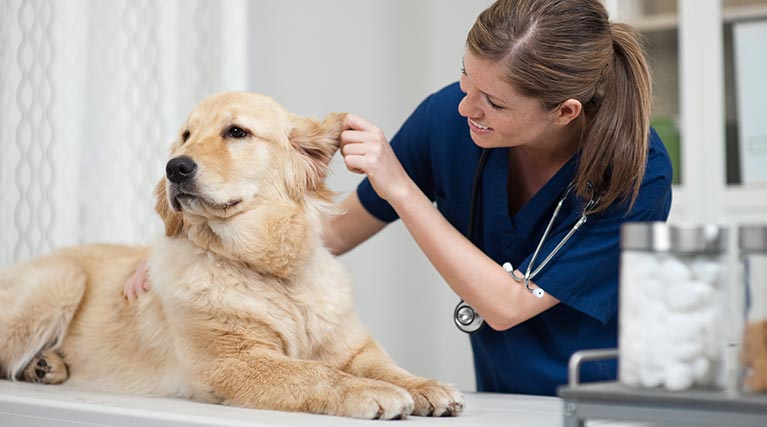Vaccination Guidelines From Your Relied On Vet
Inoculation standards supplied by your trusted veterinarian play an important role in safeguarding your pet's wellness and health. Core injections are essential for all animals, while non-core vaccines can be customized to certain way of lives and environmental direct exposures. Recognizing the subtleties of vaccination schedules, which start as very early as six to eight weeks, is vital for optimal defense. In addition, resolving typical misconceptions bordering vaccinations can further enhance animal owners' confidence in these safety nets. As we explore these critical facets, it becomes increasingly clear why normal assessments with your vet are vital for informed decision-making.

Value of Inoculations
Vaccinations play an essential duty in guarding pet dogs versus a variety of preventable diseases. By stimulating the body immune system to identify and deal with certain microorganisms, injections substantially minimize the incidence of infectious diseases that can impact a pet's health and longevity. Not only do vaccinations safeguard individual pets, however they also add to herd resistance, consequently decreasing the overall frequency of illness in the animal population.
Prompt vaccinations aid to alleviate the spread of diseases such as rabies, parvovirus, and distemper, which can have extreme repercussions for both pets and human beings. Inoculations are often a demand for boarding facilities, grooming solutions, and canine parks, making them crucial for those who desire to socialize their pet dogs.

Core Injections for Pets
While the details inoculation needs of pet dogs can vary based upon private elements, core vaccines are generally suggested to protect versus the most serious and typical diseases (Pet Vaccinations). Core vaccines are those regarded vital for all pets, no matter of their lifestyle or geographical location, as they secure versus extremely transmittable and potentially deadly illnesses
For dogs, the core injections consist of those for canine distemper, parvovirus, adenovirus (liver disease), and rabies. Adenovirus can result in liver condition, while rabies is a zoonotic disease that presents a threat to both people and pet dogs.
In cats, core injections incorporate feline panleukopenia, feline calicivirus, feline herpesvirus (rhinotracheitis), and rabies. Feline panleukopenia is a very transmittable viral disease that impacts the body immune system and intestinal tracts. Calicivirus and herpesvirus are significant factors to upper breathing infections in pet cats, while rabies continues to be an important problem for public health.
Talk to your veterinarian to ensure your family pets obtain their core vaccinations on timetable.
Non-Core Vaccines Explained
Non-core vaccines are tailored to deal with particular dangers connected with a family pet's way of living, exposure, and environment to specific illness. Unlike core vaccines, which are widely suggested for all pets, non-core vaccines are thought about based on view it individual circumstances. These vaccines are particularly important for pet dogs that might experience unique virus as a result of their geographical location, traveling behaviors, or tasks.
Instances of non-core injections consist of those for Bordetella bronchiseptica, which is linked to kennel coughing, and Lyme condition, brought on by ticks. Pet dogs that regularly connect with other pets, such as those in boarding centers, pet parks, or brushing atmospheres, might take advantage of Bordetella inoculation. If you live in a location where Lyme condition is prevalent, immunizing against this illness can be a sensible choice for outdoor-loving pets.
Various other non-core vaccines might consist of those for leptospirosis, canine flu, and feline leukemia, depending on the particular threat variables present. It is vital to have a detailed discussion with your veterinarian regarding your animal's way of living and the potential need for these vaccinations, making sure a customized inoculation strategy that best shields your hairy close friend.
Vaccination Set Up Introduction

As pets mature, it is crucial to comply with the advised booster inoculations. Veterinarian Enterprise. For grown-up pets, core vaccines are commonly given every one to three years, depending upon the details vaccination and neighborhood policies. Non-core vaccinations might be advised based upon lifestyle factors and regional illness frequency, necessitating a tailored approach
Routine veterinary exams are critical for upgrading inoculation routines. Your vet can offer assistance on the most suitable immunizations for your animal, considering age, health and wellness status, and ecological threats. By staying proactive and notified, animal owners can ensure their hairy buddies obtain prompt and efficient vaccinations, consequently safeguarding their wellness and health throughout their lives.
Typical Myths Concerning Vaccines
Misconceptions regarding animal inoculations can cause confusion and hesitation among family pet owners pertaining to the booster shot procedure. One prevalent myth is that vaccinations are unnecessary for indoor pet dogs. While it holds true that indoor family pets encounter reduced threats, they are not totally unsusceptible to conditions, as pathogens can be presented with different methods, consisting of human clothes and various other family pets.
One more misconception is that vaccinations can create the diseases they aim to stop. In truth, a lot of injections have suspended or undermined pathogens, which can not trigger illness in healthy and balanced animals. Some animal proprietors likewise believe that their family pets should not be vaccinated if they are already healthy and balanced; nevertheless, inoculations are a proactive measure that assists stop the beginning of health problem.
In addition, lots of animal owners are afraid that injections will lead to lasting health and wellness difficulties. The advantages of vaccination-- shielding animals from potentially serious conditions-- much outweigh the dangers.
Verdict
In recap, adherence to inoculation standards is important for ensuring the wellness and durability of animals. Dispelling usual misconceptions bordering vaccinations further strengthens the value of informed decision-making in pet care.
Not just do inoculations safeguard specific animals, however they additionally add to herd immunity, consequently reducing the total frequency of illness in the pet population.
Misconceptions regarding family pet inoculations can lead to complication and hesitation among animal proprietors relating to the booster shot procedure. While it's real that indoor pet dogs deal with lower threats, they are not completely immune to conditions, as virus can be introduced via different ways, websites including human garments and other family pets.
Some family pet owners likewise think that their pet dogs must not be vaccinated if they are currently healthy; however, inoculations are a positive action that assists avoid the onset of disease.
The benefits of vaccination-- safeguarding pet dogs from possibly dangerous diseases-- far surpass the risks.